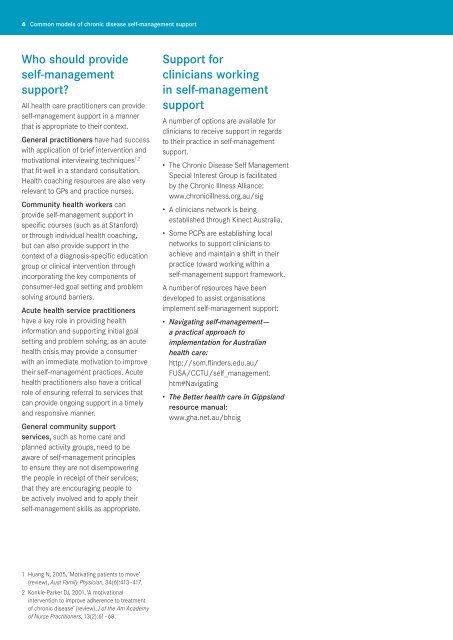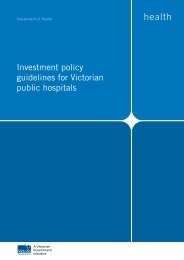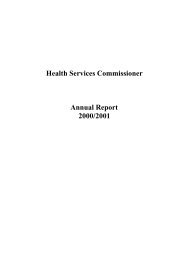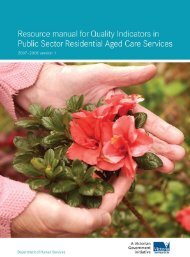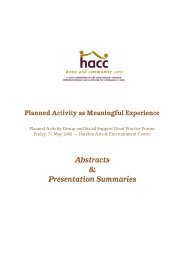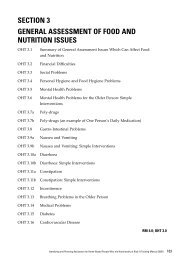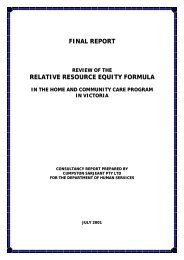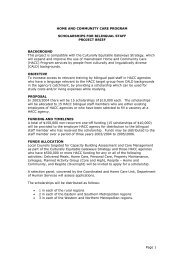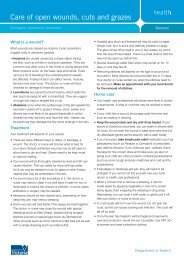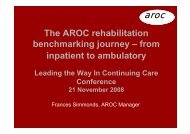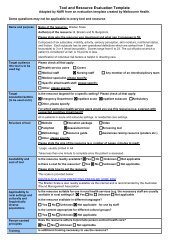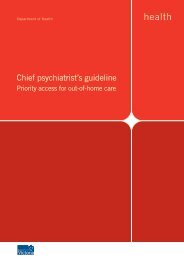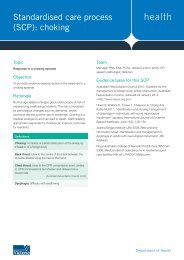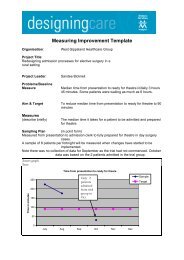Common models of chronic disease self-management support
Common models of chronic disease self-management support
Common models of chronic disease self-management support
You also want an ePaper? Increase the reach of your titles
YUMPU automatically turns print PDFs into web optimized ePapers that Google loves.
4 <strong>Common</strong> <strong>models</strong> <strong>of</strong> <strong>chronic</strong> <strong>disease</strong> <strong>self</strong>-<strong>management</strong> <strong>support</strong><br />
Who should provide<br />
<strong>self</strong>-<strong>management</strong><br />
<strong>support</strong>?<br />
All health care practitioners can provide<br />
<strong>self</strong>-<strong>management</strong> <strong>support</strong> in a manner<br />
that is appropriate to their context.<br />
General practitioners have had success<br />
with application <strong>of</strong> brief intervention and<br />
motivational interviewing techniques 1,2<br />
that fit well in a standard consultation.<br />
Health coaching resources are also very<br />
relevant to GPs and practice nurses.<br />
Community health workers can<br />
provide <strong>self</strong>-<strong>management</strong> <strong>support</strong> in<br />
specific courses (such as at Stanford)<br />
or through individual health coaching,<br />
but can also provide <strong>support</strong> in the<br />
context <strong>of</strong> a diagnosis-specific education<br />
group or clinical intervention through<br />
incorporating the key components <strong>of</strong><br />
consumer-led goal setting and problem<br />
solving around barriers.<br />
Acute health service practitioners<br />
have a key role in providing health<br />
information and <strong>support</strong>ing initial goal<br />
setting and problem solving, as an acute<br />
health crisis may provide a consumer<br />
with an immediate motivation to improve<br />
their <strong>self</strong>-<strong>management</strong> practices. Acute<br />
health practitioners also have a critical<br />
role <strong>of</strong> ensuring referral to services that<br />
can provide ongoing <strong>support</strong> in a timely<br />
and responsive manner.<br />
General community <strong>support</strong><br />
services, such as home care and<br />
planned activity groups, need to be<br />
aware <strong>of</strong> <strong>self</strong>-<strong>management</strong> principles<br />
to ensure they are not disempowering<br />
the people in receipt <strong>of</strong> their services;<br />
that they are encouraging people to<br />
be actively involved and to apply their<br />
<strong>self</strong>‐<strong>management</strong> skills as appropriate.<br />
Support for<br />
clinicians working<br />
in <strong>self</strong>‐<strong>management</strong><br />
<strong>support</strong><br />
A number <strong>of</strong> options are available for<br />
clinicians to receive <strong>support</strong> in regards<br />
to their practice in <strong>self</strong>-<strong>management</strong><br />
<strong>support</strong>.<br />
• The Chronic Disease Self Management<br />
Special Interest Group is facilitated<br />
by the Chronic Illness Alliance:<br />
www.<strong>chronic</strong>illness.org.au/sig<br />
• A clinicians network is being<br />
established through Kinect Australia.<br />
• Some PCPs are establishing local<br />
networks to <strong>support</strong> clinicians to<br />
achieve and maintain a shift in their<br />
practice toward working within a<br />
<strong>self</strong>‐<strong>management</strong> <strong>support</strong> framework.<br />
A number <strong>of</strong> resources have been<br />
developed to assist organisations<br />
implement <strong>self</strong>-<strong>management</strong> <strong>support</strong>:<br />
• Navigating <strong>self</strong>-<strong>management</strong>––<br />
a practical approach to<br />
implementation for Australian<br />
health care:<br />
http://som.flinders.edu.au/<br />
FUSA/CCTU/<strong>self</strong>_<strong>management</strong>.<br />
htm#Navigating<br />
• The Better health care in Gippsland<br />
resource manual:<br />
www.gha.net.au/bhcig<br />
1 Huang N, 2005, ‘Motivating patients to move’<br />
(review), Aust Family Physician, 34(6):413–417.<br />
2 Konkle-Parker DJ, 2001, ‘A motivational<br />
intervention to improve adherence to treatment<br />
<strong>of</strong> <strong>chronic</strong> <strong>disease</strong>’ (review), J <strong>of</strong> the Am Academy<br />
<strong>of</strong> Nurse Practitioners, 13(2):61–68.


